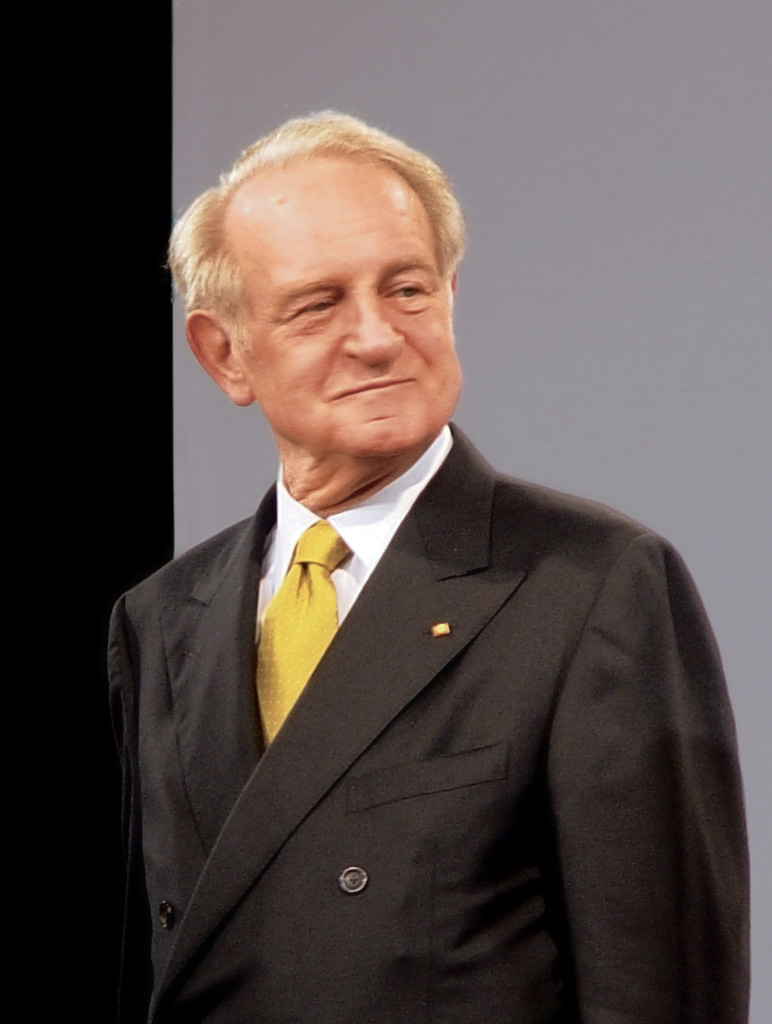- Johannes Rau
Infobox_President
name =Johannes Rau
nationality =German

order = 12thPresident of Germany
8th President of the Federal Republic of Germany
term_start =July 1 ,1999
term_end =June 30 ,2004
chancellor =Gerhard Schroeder
predecessor =Roman Herzog
successor =Horst Köhler
order2 =Minister-President ofNorth Rhine-Westphalia
term_start2 =1978
term_end2 =1998
predecessor2 =Heinz Kühn
successor2 =Wolfgang Clement
order3 = President of the German Bundesrat
term_start3 =1982
term_end3 =1983
president3 =Karl Carstens
chancellor3 =Helmut Kohl
predecessor3 =Hans Koschnick
successor3 =Franz Josef Strauss
birth_date =birth date|1931|1|16|mf=y
birth_place =Wuppertal , Germany
death_date =death date and age|2006|1|27|1931|1|16
death_place =Berlin , Germany
party =
spouse =Christina Rau
profession =Journalist
religion =Evangelical Church in the Rhineland (Protestant)Johannes Rau (
January 16 ,1931 –January 27 ,2006 ) was a Germanpolitician of the SPD. He was the eighth President of the Federal Republic of Germany fromJuly 1 ,1999 , untilJune 30 ,2004 , and prime minister ofNorth Rhine-Westphalia from 1978 to 1998.Education and work
Rau was born in the
Barmen part ofWuppertal ,Rhine Province , as the third of five children. His family was strongly Protestant. As a schoolboy, Rau was active in theConfessing Church , a circle of the German Protestant Church which actively resistedNazism .Rau left school in 1949 and worked as a journalist and publisher, especially with the Protestant Youth Publishing House.
Political biography
Rau was a member of the All-German People’s Party (GVP), which was founded by
Gustav Heinemann . This party was known for proposing German reunification, from 1952 until it was disbanded in 1957.In 1958, Rau and his political mentor,
Gustav Heinemann , joined theSocial Democratic Party of Germany (SPD), where he was active in the Wuppertal chapter. He served as deputy chairman of the SPD party of Wuppertal, and was elected later on to the City Council (1964-1978), where he served as chairman of the SPD Group (1964-1967) and later as Mayor (1969-1970).In 1958, Rau was elected for the first time as member of the "Landtag" (state parliament) of
North Rhine-Westphalia (NRW). In 1967, he became chairman of the SPD fraction in the Landtag, and in 1970 Minister of Science and Education in the cabinet of Minister PresidentHeinz Kühn . He soon gained a reputation as a reformer. As part of the mass-education campaign of the 1970s, he founded five universities, each at different sites, in North Rhine-Westphalia and initiated Germany’s firstdistance learning university atHagen (modelled on the "Open University ").In 1977, Rau became Chairman of the North Rhine-Westphalia SPD, and in 1978 Minister President of the state, were he remained until 1998, with four successful elections for the SPD, which became strongest party in the Landtag each time and gained an absolute majority three times, in 1980, 1985, 1990 and finally 1995. From 1995 onwards, Rau led an SPD-Greens coalition in NRW.
In 1987, Rau tried to become chancellor of Germany for the SPD, but his refusal to contemplate forming a coalition with the Green Party meant he could not win the elections against
Helmut Kohl ’s Christian Democrats (CDU). In 1994, Rau tried for the first time to become Federal President, but lost toRoman Herzog .Rau twice served as President of the Bundesrat in 1982/83 and 1994/95, and thus deputised for the Federal President. In 1998 Rau stepped down from his positions as SPD Chairman and Minister President, and on
May 23 ,1999 , was elected Federal President by theFederal Assembly of Germany to succeedRoman Herzog (CDU). OnJuly 1 ,2004 , he was succeeded byHorst Köhler .In 2000, Rau was the first German head of state since the
Holocaust to address theKnesset , the Israeli parliament, in German. This controversial step prompted some Israeli delegates to walk out. However, Israeli PresidentMoshe Katsav supported and praised him for bridging the gap between the two states. Rau had a deep and life-long commitment to bringing reconciliation between Germany and its past.Following a long history of heart disease, he died a few days after his 75th birthday.
[

Schloss Bellevue in 2002.]Motto and maxim
The maxim of Rau was “to reconcile, not divide”.
As his personal motto, Rau adopted the
Confessing Church dictum “teneo, quia teneor” (I hold because I am held).In his acceptance speech after his election, Rau claimed “A patriot I will be” because “a patriot is someone who loves his fatherland, a nationalist is someone who despises the fatherlands of the others”. The quote can be attributed to the French writer
Romain Gary .Prizes and medals
Rau was awarded fifteen honorary
doctorate s.Private life
Rau was known as a practising Christian (and sometimes titled _de. "Bruder Johannes", "Brother John", to ridicule his intense Christian position; however, he sometimes used this term himself). He held lay positions in, and was a member of, the
Synod of theEvangelical Church in the Rhineland .On
August 9 ,1982 , Rau married the political scientist, Christina Delius (born 1956). Christina Rau is a granddaughter of her husband's mentor,Gustav Heinemann , formerPresident of Germany . The couple had three children: Anna Christina, born 1983, Philip Immanuel, born 1985 and Laura Helene, born 1986.After leaving office, Rau lived with his family in the federal capital,
Berlin . However, they also kept a house in Wuppertal.Rau died in Berlin on
January 27 ,2006 .ee also
*
Germany
*Politics of Germany External links
* [http://eng.bundespraesident.de/-,12101/Johannes-Rau.htm www.bundespraesident.de: Johannes Rau] —Official biography
* [http://www.trauer-beileid.de/kondolenzbuch/155-Alt-Bundespraesident-Johannes-Rau.htm online book of condolence for Johannes Rau]Persondata
NAME=Rau, Johannes
ALTERNATIVE NAMES=
SHORT DESCRIPTION=President of Germany from1 July 1999 until30 June 2004
DATE OF BIRTH=birth date|1931|1|16|df=y
PLACE OF BIRTH=Wuppertal-Barmen
DATE OF DEATH=death date|2006|1|27|df=y
PLACE OF DEATH=Berlin
Wikimedia Foundation. 2010.
